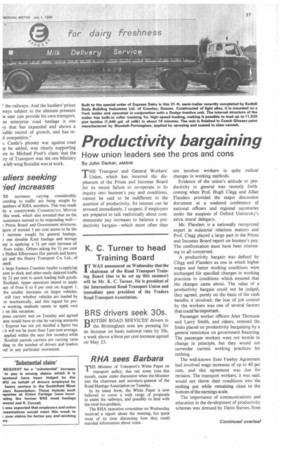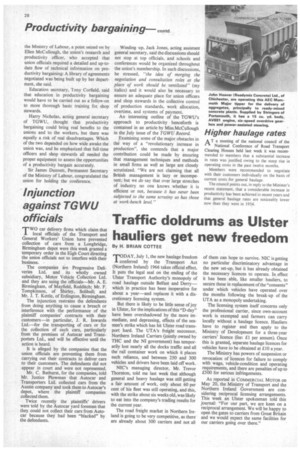Productivity bargaining
Page 29

Page 30

If you've noticed an error in this article please click here to report it so we can fix it.
How union leaders see the pros and cons
By John Darker, AMBIM THE Transport and General Workers' Union, which has incurred the displeasure of the Prices and Incomes Board for its recent failure to co-operate in its inquiry into busmen's pay and conditions, cannot be said to be indifferent to the question of productivity. Its interest can be aroused immediately, I suspect, if employers are prepared to talk realistically about commensurate pay increases to balance a productivity bargain—which more often than not involves workers in quite radical changes in working methods.
Evidence of the union's attitude to productivity in general was recently forthcoming when Prof. Hugh Clegg and Allan Flanders provided the major discussion document at a weekend conference of national officers and regional secretaries under the auspices of Oxford University's extra mural delegacy.
Mr. Flanders is a nationally recognized expert in industrial relations matters and Prof. Clegg played a large part in the Prices and Incomes Board report on busmen's pay. The confrontation must have been interesting to all concerned.
A productivity bargain was defined by Clegg and Flanders as one in which higher wages and better working conditions were exchanged fdr specified changes in working practices in conditions which ensured that the changes came about. The value of a productivity bargain could not be judged, they agreed, purely on the basis of the cash benefits it involved; the loss of job control by the workers was one of several factors that could be important.
Passenger worker officers Alan Thomson and Larry Smith, and others, stressed the limits placed on productivity bargaining by a general restriction on government financing. The passenger workers were not hostile to change in principle, but they would not surrender current working practices for nothing.
The well-known Esso Fawley Agreement had involved wage increases of up to 40 per cent, and this agreement was due for revision. The transport workers, it was said, would not throw their conditions into the melting pot while remaining close to the bottom of the earnings scale.
The importance of communications and education in the development of productivity schemes was stressed by Denis Barnes, from the Ministry of Labour, a point seized on by Ellen McCullough, the union's research and productivity officer, who accepted that union officials required a detailed and up-todate flow of technical information on productivity bargaining: A library of agreements negotiated was being built up by her department, she said.
Education secretary, Tony Corfield, said that education in productivity bargaining would have to be carried out as a follow-on to more thorough basic training for, shop stewards.
Harry Nicholas, acting general secretary of TGWU. thought that productivity bargaining could bring real benefits to the unions and to the workers, but there was equally a risk of real disadvantages. Which of the two depended on how wide awake the union was, and he emphasized that full-time officers and shop stewards all needed the proper equipment to assess the opportunities of a productivity bargain accurately.
Sir James Dunnett. Permanent Secretary of the Ministry of Labour, congratulated the union for holding the conference.
Winding up, Jack Jones, acting assistant general secretary. said the discussions should not stop at top officials, and schools and conferences would be organized throughout the union's membership. In such discussions, he stressed, "the idea of merging the negotiation and consultation roles at the place of work should be ventilated" (my italics) and it would also be necessary to ensure an adequate place for union officers and shop stewards in the collective control of production standards. work allocation, overtime, and systems of payment.
An interesting outline of the TGWU's approach to productivity henceforth is contained in an article by Miss McCullough in the July issue of the TGWU Record.
Examining some of the major obstacles in the way of a "revolutionary increase in production-. she contends that a major contribution could be made by ensuring that management techniques and methods in small firms as well as large are closely scrutinized. -We are not claiming that all British management is lazy or incompetent; but we do say that over large stretches of industry no one knows whether it is efficient or not, because it has never been subjected to the same scrutiny as has those at work-bench level."




























































































































